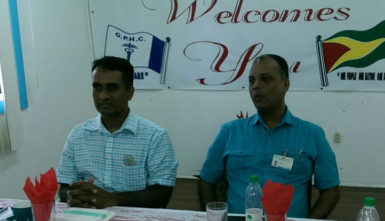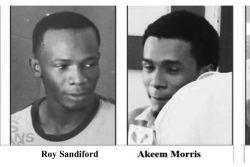Acting Chief Executive Officer Dr Sheik Amir and other hospital managers say patient overcrowding and staff shortages continue to plague the Georgetown Public Hospital (GPH).
At a media breakfast held at the hospital on Friday, Dr Amir said the GPH is facing a number of issues that are out of its control.
Of grave concern, Dr Amir noted, is that since the hospital is the only national referral institute, it sees 8,000 patients per week, while there is a shortage of beds.
Dr Amir said the shortage of beds has a lot to do with relatives who have neglected their family members who are patients at the hospital.

He said many times the patients are looked after and then they are discharged but there is no one to take them home. “We cannot put the people out on the corner; that will become a big issue,” Dr Amir said, while adding that some discharged patients are left in the GPH’s wards for months.
Dr. David Samaroo, head of the surgical department, noted that he too has experienced that problem where he has discharged patients and the relatives have refused to collect them. He said that in one such instance, he called a relative to come to pick up a family member and she threatened to go to the media.
Dr Samaroo said that patients who are discharged and have nowhere to go take up the bed space, preventing others who need a bed to recover from their surgeries. He noted that there are nine patients who have taken up residence at the hospital due to neglect.
Meanwhile, the head of the Accident and Emergency Unit Dr Zulfikar Bux said that while patients come to the emergency room with the expectation that there is a bed, there are 17 beds, which doctors try to rotate.
Apart from this, Dr Amir pointed out that it is not just the living that are neglected at the hospital but also the dead. Dr Amir said that persons have become too callous in respect of their own relatives. He said the financial burden of burying the bodies that are neglected at the morgue is borne by the hospital and the government. Dr Amir detailed that those bodies are buried together in plyboard boxes, which he described as “not nice.”
Dr Amir also lamented the shortage of drugs, which he said is out of the hospital’s control. He said if the suppliers don’t provide the quantity of medication the hospital needs, then it is left in a dilemma.
Dr Amir added that given the large volumes of patients that come to the hospital, including patients referred from private hospitals, laboratory departments, such as the x-ray department which runs on a 24-hour basis, can eventually suffer malfunctions or damage to equipment.
Dr Amir also noted that while the hospital has a staff of over 1,600, not all are medical and there is a shortage of professional staff in different departments.
Nevertheless, the doctors said that despite the shortcomings of the hospital, some of the staffers have cut their lunch periods and increased their working hours to meet the needs of their patients and for that they commended their staff. The acting CEO added that the hospital staff is dedicated to improving the situation at the hospital.








